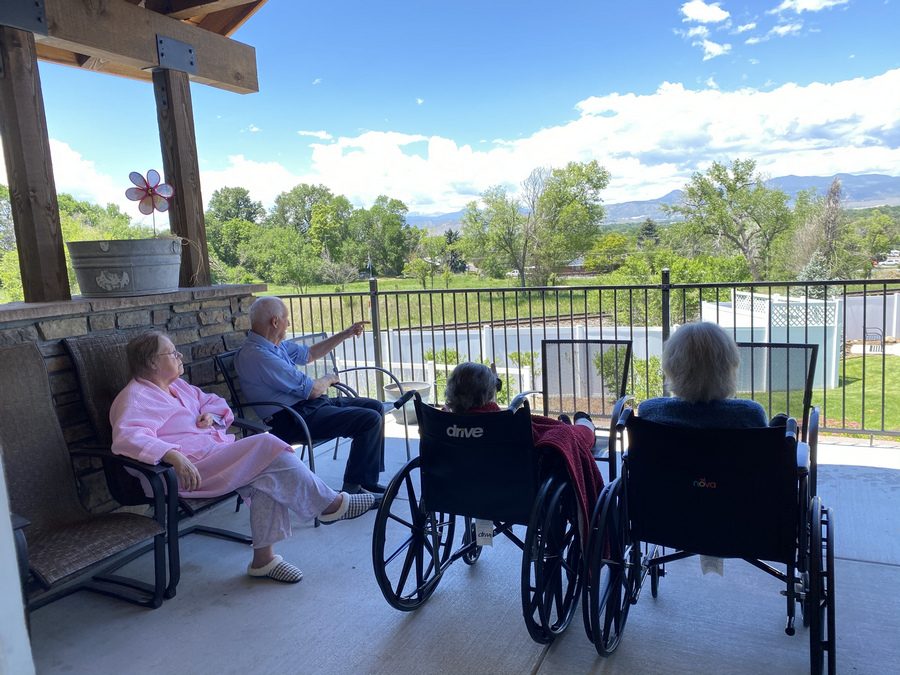


Even medical experts are understanding why smaller memory care homes are better for seniors with dementia.
When it comes to long-term dementia care, choosing the proper environment is a critical decision. Small memory care homes, like those at Applewood Our House, have many advantages over larger facilities.

Applewood Our House firmly believes that small environments are essential for memory and dementia care.
We choose smaller-sized memory care homes with fewer residents. This reduces agitation and enhances our residents’ overall quality of life.
Smaller environments excel in minimizing visual and aural overstimulation. This provides residents with a calmer and more comfortable atmosphere.
In contrast, larger living spaces can be disorienting and contribute to higher levels of agitation.
In our five memory care communities at Applewood Our House, we prioritize individual preferences, encourage family involvement, delve into resident histories, and promote meaningful personal interactions.
Achieving this level of personalized care can be challenging in larger care facilities.
Anxiety is a common challenge for seniors with dementia. This is often triggered by changes in routine, perceived threats, discomfort or pain, fear, and changes in their environment.
Identifying and managing these triggers is more feasible in smaller memory care homes, where the environment is quieter, less distracting, and more familiar.
Studies published in the National Library of Medicine (NLM) made the comparison between small and large memory care communities.
The findings show that physical environments are essential for people with dementia. highlighting the benefits of smaller care facilities.

• Aging in Place – Our small-sized memory care homes at Applewood Our House enable residents with dementia to age in place comfortably.
• Reduced Agitation – Smaller environments effectively diminish agitation and reduce harmful behaviors.
• Autonomy and Independence – Residents in smaller memory care homes have a better chance of reaching their full potential, achieving independence, and enjoying a higher quality of life.
• Engagement in Activities – Smaller, home-like settings encourage higher participation in activities and engagement in preferred hobbies.
• Improved Daily Living – Residents in smaller communities tend to have better functioning in activities of daily living (ADLs) such as eating, drinking, dressing, and toileting.
• Enhanced Wayfinding – Fewer pathways and shorter walking routes lead to less confusion and better resident orientation.
• Relaxing Environment – Smaller environments create a relaxed ambiance, reducing wandering, distractive behaviors, and anxiety.
• Staff Quality – Smaller, home-like environments allow our staff to tailor activities to individual needs, supporting a person-centered care approach.
Quality staff training and compassionate care are essential for effective dementia care.

• Personalized Care – Smaller environments allow for more personalized care, catering to individual preferences and needs.
• Reduced Agitation – Minimized overstimulation in smaller homes results in a calmer atmosphere, reducing anxiety and agitation for residents.
• Enhanced Engagement – Residents in smaller settings often participate more actively in activities and enjoy higher engagement in preferred hobbies.
• Improved Daily Living – Better functioning in daily living (ADLs), such as eating, dressing, and toileting, is observed in smaller facilities.
• Enhanced Wayfinding – Fewer pathways and shorter walking routes lead to less confusion and better resident orientation.
• Relaxing Environment – Smaller environments create a relaxed ambiance, reducing wandering, distractive behaviors, and anxiety.
• Quality Staff Interaction – Well-trained staff can tailor activities to individual needs, ensuring a person-centered care approach.
• Limited Resources – Some smaller homes may have limited resources and services compared to more extensive facilities.
• Fewer Amenities – Amenities such as on-site gyms or swimming pools may be limited in smaller homes.
• More Resources – Some larger facilities often have access to more resources, including advanced medical equipment and specialized care.
• Greater Amenities – Larger facilities may offer a broader range of amenities, such as fitness centers and recreational activities.
• Diverse Social Opportunities – More residents have more opportunities for social interaction and companionship.
• Variety of Care Services – Larger facilities may provide a broader range of care services, including skilled nursing care.
• Less Personalized Care – In larger facilities, it can be challenging to provide the same personalized care offered in smaller homes.
• Higher Staff-to-Resident Ratio – Larger resident populations may lead to higher staff-to-resident ratios, potentially resulting in less individual attention.
• Overstimulation – Larger living spaces can be overwhelming for seniors with dementia, leading to increased agitation.
• Limited Privacy – Residents in larger facilities may have less privacy due to more residents and staff.
According to the Alzheimer’s Association, small-house nursing homes are gaining popularity as they offer person-centered care, greater independence, and improved quality of life for residents compared to traditional models.
The Green House® Project is a non-profit organization promoting the small-house model, emphasizing deinstitutionalization, de-stigmatization, and humanization in nursing home care.

Choosing between small memory care homes and larger facilities depends on your loved one’s needs and preferences.
Smaller homes excel in providing personalized care and reducing agitation. At the same time, some larger facilities offer a broader range of resources and amenities.
Consider your loved one’s requirements and priorities when making this critical decision.
For more information and assistance or to schedule a tour, contact us at (303) 956-9037 or take a Virtual Tour of our five lovely homes.
We’re here to support you in finding the best dementia care for your loved one.
Experience the benefits of smaller environments in dementia care at Applewood Our House.